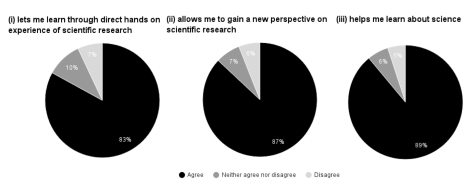My name is Dr. Karen Masters, and I’m an astronomer working at the University of Portsmouth. My main involvement with the Zooniverse over the last 8 years or so has been through my research into galaxy evolution making use of the Galaxy Zoo classifications (see Zooniverse Publication list), and as the Project Scientist for Galaxy Zoo I enjoy organizing science team telecons, and research meetings. I’ve also written many blog posts about galaxy evolution for the Galaxy Zoo blog.
Being involved in Galaxy Zoo has opened many interesting doors for me. I have always had a keen interest in science communication and science education. In fact, working with Galaxy Zoo has been a real pleasure because of the way it blurred the lines between astronomical research and public engagement.
A couple of years ago I was given the opportunity to get more formally engaged in researching how Galaxy Zoo (and other Zooniverse projects) contribute to science communication/education. A colleague of mine in the Portsmouth Business School, who is an expert in the economics of volunteering, led a team (which I was part of) which was successful in obtaining funding for a 3 year project to study the motivations of citizen scientists, including how scientific learning contributes to the motivations. We call our project VOLCROWE.
The VOLCROWE survey, which ran in late March/early April of last year included a science quiz, which tested both general science knowledge, and knowledge specific to five different surveys. This meant that the data collected could be used to investigate, in a statistical sense, how much you are learning about scientific content while classifying on Zooniverse projects.
We collected complete responses to the survey from almost 2000 Zooniverse volunteers spread across Galaxy Zoo, Planet Hunters, Penguin Watch, Seafloor Explorer and Snapshot Serengeti.
The survey respondents certainly believed they were learning about science through their participation. When asked if they Zooniverse (i) lets them learn through direct hands on experience of scientific research; (ii) allows them to gain a new perspective on scientific research; or (iii) helps them learn about science, and overwhelming majority (more than 80% in all cases) agreed, or strongly agreed.

We were also able to find evidence in the survey responses that project specific science knowledge correlated positively with measures of active engagement in the project. Put plainly, people who classified more on a given project we found to know more about the scientific content of that project. We could use the scores from the general science quiz as a measure of unrelated scientific knowledge (which did not correlate with how much people classified) to claim that this correlation is causal – i.e. people are learning more about the science behind our projects the more time they spend classifying.
A different VOLCROWE publication, “How is success defined and measured in online citizen science? A case study of Zooniverse projects”, Cox et al. (2015), measured the success of Zooniverse projects in different metrics. In that work we demonstrated that projects could be scientifically successful (i.e. contribute to increased scientific output) without being very successful in public engagement. However, public engagement success without good scientific output was not found in any of the Zooniverse projects studied in Cox et al. (2015). Four of our five projects in our Science Learning study were part of Cox et al. (2015; Penguin Watch hadn’t launched at that time) and in Masters et al. (2016) we were able to show that the better projects did in public engagement success metrics, in general the stronger the correlation we found between scientific knowledge and time spent classifying. This does not seem too surprising, but it’s nice to show with data.
We concluded thus:
“Our results imply that even for citizen science project designed primarily to meet the research goals of a science team, volunteers are learning about scientific topics while participating. Combined with previous work (Cox et al. 2015) that suggested it is difficult for projects to be successful at public engagement without being scientifically successful (but not vice versa) this has implications for future design of citizen science projects, even those primarily motivated by public engagement aims. While scientific success will not alone lead to scientific learning among the user community, we argue that these works together demonstrate scientific success is a necessary (if not a sufficient) requirement for successful and sustainable public engagement through citizen science. We conclude that the best way to use citizen science projects to provide an environment that facilitates science learning is to provide an authentic science driven project, rather than to develop projects with solely educational aims.”
As you may know, authenticity is at the heart of the Zooniverse Philosophy, so it was really nice to find this evidence which backs that up. You know you can trust Zooniverse projects to make use of your classifications to make contributions to the sum of knowledge of humankind.
I also had great fun writing this up for publication, a process which involved me learning a great deal about what is meant by “Science Learning” in the context of research into science communication.
It was published today in the Journal of Science Communication, Special Edition in Citizen Science (Part II). You can also read the paper in full in the open access archive at: https://arxiv.org/abs/1601.05973.

I’ve been involved with Zooniverse for years. I like the feeling that I am contributing. I like the methodology employed by the projects. I like what feedback is given. As a science teacher during my career, it has been my goal to not only teach content, but to make the learners feel engaged to want to know more about many things.
Keep up the good work.